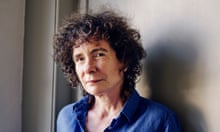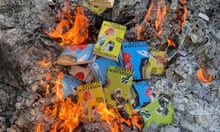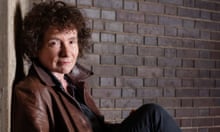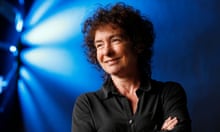There’s a disconcerting silence outside Jeanette Winterson’s London pied-a-terre. It’s the morning after the night before, when she travelled across London after dinner with her publisher to scenes of football fans setting the city alight with their cup final fervour. “It was uproar,” she says, “We saw cars on fire.” Her flat is in the East End district of Spitalfields in a Georgian house, which she bought 25 years ago, complete with a little shop that she ran for years as an organic grocer and tea room until the rates got too high, and she let it out to an upmarket chocolatier.
It’s as if a scene from Dickens’s The Old Curiosity Shop has been dropped into a satire about prosperity Britain: the quaint old shopfront is still intact, while outside it a lifesize sculpture of a rowing boat full of people sits surreally in the middle of the street, and a little further along, a herd of large bronze elephants frolics. These public artworks only arrived a few weeks ago, Winterson explains, as part of a grand plan to pedestrianise the area, and make it more buzzy, just at the moment that the sort of well-heeled office workers who bought upmarket chocolates are abandoning it owing to the Covid pandemic.
We’re at a transitional moment in so many ways, she says – a perfect moment to launch a book that reassesses the past while staring the future in the face. 12 Bytes is sub-titled: How We Got Here. Where We Might Go Next. It’s a series of essays that places women at the centre of the tumultuous 200-year history that stretches back to a wet summer in Italy, when a teenage Mary Shelley conjured the myth of Frankenstein from the embryonic science of electricity. Briskly and breezily, it joins the dots in a neglected narrative of female scientists, visionaries and code-breakers who gave us modernity and could, she insists, deliver a viable future to us if only we’d get better at listening to them.
The book is the result of a pandemic hunkered down alone at her main home in the Cotswolds, reading dispatches from the frontiers of science and economics online and in every publication she could lay her hands on. Her author picture shows her with a robotic eyeplate. Two of the more startling provocations of 12 Bytes are that “transhumanism [a hybrid of human and machine] will be the new mixed-race” – and that, when this future arrives, in questions of “them and us”, Homo sapiens will be the “them”. But all is not lost, she writes. “Our encounter with AI – our self-created nemesis and, I suspect, our last chance – may ensure that human exceptionalism will give way to humility.”
“Look, you know me, I’m an optimist,” she says, when I ask her to unpack these assertions. “So on the one hand, I think this could forcibly shatter so many preconceptions, which have worryingly surged at the moment, like nationalism, faith wars, and conflict over skin colour and gender binaries. All of these things have become raw and hot, so we have to look at them, and I don’t think it need go badly. Because if we do start recognising that we can create, and there are other life forms, that really is going to force us to accept that, as Homo sapiens, we need to band together, because what’s coming is likely to be more powerful, more intelligent, more capable than we are. I see it as a revaluation, and that does make me optimistic. But if we get it wrong – if we stay in our silly old mindset – then it’s likely that the dystopias that we fear will come to pass.”
At 61, Winterson is, as ever, a disarming mix of warm homeliness, dizzying flights of intellectual fancy and simmering belligerence. The homeliness is to the forefront today: we drink Yorkshire tea from a china pot on a table lovingly crafted from a sycamore tree felled in her Cotswolds wood; within seconds of a locksmith arriving to fix the door downstairs, she’s on first name terms with him. Yet a few weeks earlier she caused a social media storm by burning reissues of her own novels on a bonfire because she took exception to their cover blurbs, for turning them into “wimmin’s fiction of the worst kind”. She is quite aware of the dangerous symbolism of book-burning, pointing out that her adoptive mother burned her debut novel, Oranges Are Not the Only Fruit, in which she outed herself as gay. “I wouldn’t even burn a book by Jordan Peterson, though I think the man is repellent, because I respect books, whatever is in them. But if it’s your own, you know, you own them.”

The blurbs were the work of the same publisher that is now working hard to promote her new book. “I did feel embarrassed about ruining their Sunday,” she says. “But there’s a part of me still that can put something up on Twitter and think nothing big will happen. It’s like when I shot and skinned that rabbit.” She’s referring to a previous hullabaloo after she posted pictures of herself preparing a rabbit for the pot beneath the caption “Rabbit ate my parsley. I am eating the rabbit”. Why does she keep on hurling herself into such very public frays? “Because I’m an analogue human,” she replies. “Afterwards, my godchildren said: ‘What is the matter with you? Why didn’t you ring us before you did that?’”
The new book is dedicated to her three godchildren, with whom she remains so close that, two days earlier, she was able to call on one of them to flat-sit at a few hours’ notice after discovering that the lock had been compromised, while she was stuck in the country. The trio are her family now. For more than a decade she was in a relationship with the therapist Susie Orbach, whom she married in 2015, but it ended two years ago, unbeknownst to the wider world.
“I was saying to [my publisher] last night that we have to manage this. We’re very pleased because we’ve kept it quiet. But if we hadn’t parted two years ago, we would have parted during lockdown, which has been interesting to both of us. We looked at each other and said ‘We’d never have got through this’, because Susie is a New York Jew who belongs in the city and I need to be in the country. I need those long spaces, I need the quiet. I need to look out of the window and actually see a tree. We tried so hard to somehow find a way that it would work. And in the end, we were just spending less and less time together.”
In the context of her 2011 memoir, Why Be Happy When You Could Be Normal?, their break-up seems particularly poignant. The memoir tracked Winterson’s life from a miserable childhood with the rigid “Mrs Winterson” in the Lancashire town of Accrington, through the liberation of Oxford University and early literary success in London, to the breakdown that brought her to the point of making peace with her own history, as a child who was given up for adoption at just six weeks old by her 17-year-old birth mother. It was Orbach who helped her to track down her mother, who wrestled with the bureaucracy of the adoption register, who suggested to her that, though she knew how to love, she didn’t know how to be loved, and who reassured her that “if we have to part, you will know you were in a good relationship”.
The memoir ended with a cliffhanger: would she or would she not become part of the family into which she was born? “Happy endings are only a pause,” she wrote. “There are three kinds of big endings: revenge, tragedy, forgiveness. Revenge and tragedy often happen together. Forgiveness redeems the past, forgiveness unblocks the future.” So did she or didn’t she? “Love doesn’t just happen and I think the family was very cross, because I just couldn’t pretend that it had,” she says now.
“I think a lot of adopted children feel that they have the moment and it doesn’t work. And you have to accept it and say: ‘I’m glad I went on with this story. I’m glad I found you. I hope you’re glad you found me because, hey, I’m all right. But whatever we’re doing now isn’t love.’ It might be recognition, it might be resolution. It might be all sorts of bits of the story that we needed. And I believe I did need it. But no, it wasn’t love.”
It is our failure to face up to the realities of love that have led us to the parlous state in which we now find ourselves, she suggests in 12 Bytes, and which prevent us from becoming our best selves. “It’s easy to do sex, but it’s not easy to do love in whatever form, she says. “And if you can’t love, you can’t live, no matter how smart you are: things end up being jangly, hollow, and ultimately worthless. The idea that you just go through life, leaving behind wives and mistresses and abandoned children, and doing great art – for me, that can’t be a way to live. Social responsibility starts with the people who are around you, and you can’t endlessly be discarding things.” At the moment, she’s particularly exercised about the Musks and Bransons of this world. “The male push is to actually just discard the planet: all the boys are going off into space. But you know, love is also about cleaning up your mess, staying where you are, working through the issues; it’s not simply romantic love at all.”

Her interest in the potential of a world without the binaries, in a space opened out by new technology, is not new. Her 2000 novel, The Powerbook, posited the romantic and imaginative freedoms of cyberspace against the limitations of “meatspace”; 2007’s The Stone Gods suggested that robot lovers might be part of a future accommodation with a post-apocalyptic world, while 2019’s Frankissstein tells the story of transgender doctor Ry Shelley and Victor Stein, a professor specialising in “accelerated evolution”, who believes that Shelley’s “hybridity” has unlocked the future. “You aligned your physical reality with your mental impression of yourself,” he says. “Wouldn’t it be a good thing if we could all do that?”
But there is a dark side to all this. In Frankissstein, Stein teams up with a sexbot entrepreneur, who hawks lifelike “girls” with vibrating vaginas, “top-grade silicone nipples” and an “extra-wide splayed leg position”. 12 Bytes also includes a chapter on the sexbot problem, which touches on one of the book’s most insistent, and nerdiest, themes: that a benign Artificial General Intelligence (AGI) will not come to pass until we have divested the patriarchy of its control over the datasets on which all artificial intelligence is based. This means writing women back into history as active contributors to the modern world, capable of imagining the future, breaking codes and solving the knottiest scientific problems.
“It’s disappointing. It’s so crude, and it’s the place where the investment is going,” says Winterson of the global sexbot industry. “On the one hand, I talk about why an AI companion is a lovely idea, whether it’s a robo pet or just a voice that talks to you. That’s the positive side. But it’s always the same with humans, isn’t it? Then, we have sexbots, which are based on 1950 stereotypes about how a woman should behave: acquiescent, willing, always ready and patient in the home. How can that combo of 50s behaviour and porn-star looks be good for us as Homo sapiens?”
Winterson has her own AI companion – a Peloton exercise bike that accompanied her through the weeks locked down with her dog and two cats in her country cottage. “That was what made me start thinking about 2D relationships. I will never personally know any of those people who I feel I know really well through my Peloton screen every day. I have my favourite trainer, depending on my mood, and I know it’s a relationship even though it isn’t. It’s not even that we’ve been conned or fooled, because you are having a relationship. So yes. I’m deeply there with my Peloton family, as they call it.”
There has always been a proselytising zeal to Winterson’s enthusiasms. Aged 19 she voted for Margaret Thatcher “because she made sense to me. I believe I thought no, you just get out, get educated, and you don’t look back. My dad was part of that war generation who did go cycling around for work, you couldn’t defeat them, they would aways put food on the table somehow.” Today she says, she is “more socialist and much more compassionate than I was as a young person, because not everybody should be self-employed. Not everybody should have to hustle every day.” But she remains a believer in capitalism, because of its “Darwinian flexibility”. If you impose too much on people, they get restive and angry, she says. “I don’t think people want to be passive within a system. But the window has got narrower, and we will have to change that.”
Might this “we” extend to one day venturing into politics herself? “I’d love to – you know, I’m a gospel tent girl. The big tent is my home. I’m happy to get up there and take the questions and the flak, as I have for most of my life,” she says, but she’s at a loss for a party she could believe in. “I just don’t know where to do it, unless it involved some sort of coalition. The whole of the binary system – them/us, head/heart, black/white, male/female – it’s not helping any more. I’ve talked to some of my friends who are all political. And the despair I feel is, how can I mediate? How can I change things?” At the moment, she concludes, “all I can think of doing is what I’ve always done, which is writing my books, at least to start conversations. But would I like to go into politics? Yes, if there was a politics for me.”









